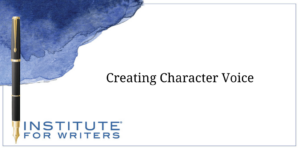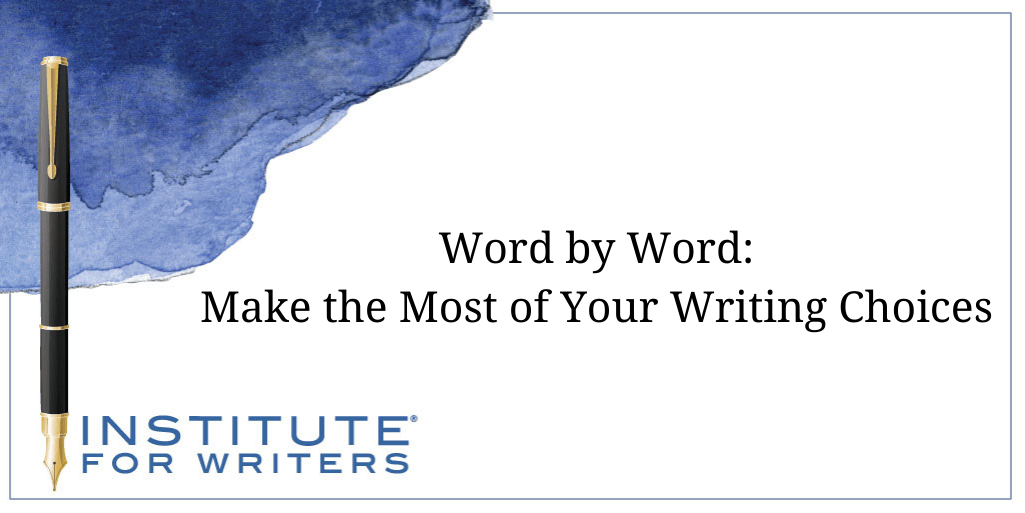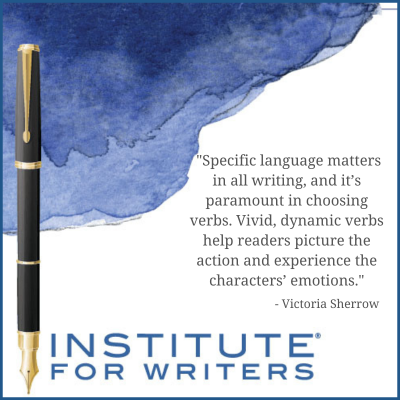
Creating Character Voice
Your readers should sense the subtle (and not-so-subtle) differences between the character voices in the stories you write. Try these exercises today!

As every writer knows, writing involves choices. We choose our settings, plots, and characters… topics and themes … audience and age group… format and presentation… Above all, we choose words. We want words that express clear ideas, engage readers, bring characters to life, create vivid images, and trigger emotions. With hundreds of thousands of words to choose from, finding the “best” ones can be challenging. Knowing some tricks of the trade can help us harness the power, even the magic, of words.
When choosing a word, we can start by asking: What does it mean? Words have a literal (direct) meaning, as shown in dictionaries and common usage. They also have connotative (implied) meanings—associations that go beyond their surface definition. Readers understand those connotations based on context, and on cultural and/or emotional factors. For example, “storm” denotes a weather event. But it expresses a far different meaning in this sentence: Hearing loud, angry voices in the kitchen, Josh rushed out the front door to avoid the storm. A person admiring a friend’s new rug might say, “That’s just beautiful!” Those same words mean something quite different when spoken by a mother who catches her child emptying a bag of flour on the floor. And what if a salesperson tells a potential customer an item is “affordable” or “a great buy” versus “really cheap”?
Poems offer useful examples. As author Minnie Walters wrote, “By tapping into the connotative meaning of a word in a poem, poets can bring life to the words and use them to create a specific atmosphere or emotion …” As you read these excerpts, think about the images and emotions they evoke:
(from Robert Bly, “The Turtle”)
“The snail climbs up the wet trunk glistening
like an angel-flight trailing long black banners.”
 (from Nikki Giovanni, “Poem”)
(from Nikki Giovanni, “Poem”)
“thinning hair
estee laudered
deliberate sentences
chubby hands
glasses resting atop ample softness…”
(from e. e. cummings, “In Just-”)
“In just spring when the world is mud-luscious…
when the world is puddle-wonderful…”
(from Mary Oliver, “The Swan”)
Did you too see it, drifting, all night, on the black river?
Did you see it in the morning, rising into the silvery air—
an armful of white blossoms…”
Whether we craft poetry or prose, thinking about connotative language can help us choose words that spark colorful images and create a specific mood (the feeling readers take away).
Specific language matters in all writing, and it’s paramount in choosing verbs. Vivid, dynamic verbs help readers picture the action and experience the characters’ emotions. Some tips:

Examples include forms of “to be” (is, was, were), has, do, get, and make.
Examples:
Bland: She was near the entrance to the park, waiting.
Specific: She stood (or paced, slouched, sat) near the entrance to the park, waiting.
Bland: They did lots of yardwork that morning.
Specific: They weeded the garden, cut the grass, and planted asters that morning.
Bland: He got sweaty during the workout.
Specific: Sweat stuck to his shirt and shone on his face during the workout.
Example:
Bland: She totally defeated the competition.
Specific: She demolished the competition.
Instead of “The wind blew loudly,” try “The wind roared.” Wind can also whistle, hum, rumble, whirr, whine, or shriek. A character who “walks slowly” might saunter, plod, stomp, meander, stroll, amble, or clomp, depending on their state of mind and destination. Instead of “she spoke softly,” consider mumbled, muttered, murmured, whispered, hissed, or purred. If your character looked angrily at somebody, did he frown, scowl, grimace, glower, glare? Such specific verbs help to reveal a character’s mood and attitude.
Passive: He got hit in the side of his head by a baseball.
Active: The baseball smacked the left side of his head. (Here, “left” adds even more specificity.)
Passive: She was blamed by her boss for mistakes made by her co-workers.
Active: Her boss blamed her for mistakes her co-workers made.
Should we always avoid passive voice? Linguist and grammar writer Jane R. Walpole has called passive verbs “a decent and respectable structure of English grammar” when they are “properly chosen.” (For more on this topic, see this article by Richard Nordquist.)
Choose words that illuminate the perspective of your fictional characters or the people in your nonfiction. Do they use casual words, slang, cliches, contractions, and/or superlatives? Do they curse or not? Do they phrase things in negative or positive terms? Maybe they use formal words and/or possess an extensive vocabulary and wealth of knowledge.
 The following examples of people expressing gratitude suggest personality traits and/or nationality or region. Which person is likely from the UK? Which statements feel informal? More formal? Who probably comes from the American South? Which sounds like talk between friends? Who seems to feel most indebted?
The following examples of people expressing gratitude suggest personality traits and/or nationality or region. Which person is likely from the UK? Which statements feel informal? More formal? Who probably comes from the American South? Which sounds like talk between friends? Who seems to feel most indebted?
“Thank you very much indeed.”
“Gee, thanks. You shouldn’t have.”
“I’m much obliged, Ma’am.”
“How can I ever thank you enough?”
Word choices determine the tone of our writing. The five sentences below all state the same fact, but they reflect different attitudes and can affect readers in different ways.
I do not want to go there.
Going there seems utterly pointless.
Going there would hardly be pleasant.
Go there? No thanks!
Going there seems about as useful as a sailboat in the desert.
Based on the words of each narrator/ character, how would you describe the tone—e. g. straightforward, sarcastic, adamant, polite, persuasive, disdainful?
With these elements in mind, you might take a fresh look at your current project(s) or those you’ve just finished. Reread that old manuscript that didn’t sell. Can you enhance the emotional impact or tone? Will different words create vibrant images? Do your characters’ words and thoughts help readers understand them better? Are your verbs strong and specific? Fine-tuning our word choices can make all the difference!
Victoria Sherrow has published short stories, articles, poetry, and books for diverse age groups. Her books have received starred reviews and been honored by the American Library Association, National Association for the Advancement of Science, and NYPL Best Books for the Teenage, among others. Victoria’s most recent nonfiction book for adults is Encyclopedia of Hair: A Cultural History (ABC-CLIO, 2023). She loves helping her students tap into their experiences, interests, knowledge, and imaginations to create their own stories and books.

Your readers should sense the subtle (and not-so-subtle) differences between the character voices in the stories you write. Try these exercises today!

Your author voice has a unique and specific makeup. The way your word choice, writing style, tone, and perspective all make your voice unique to you.

Dialogue is a powerful tool for conveying emotions. To write emotional dialogue that rings true, use these pointers from IFW Instructor Victoria Sherrow.
1000 N. West Street #1200, Wilmington, DE 19801
© 2024 Direct Learning Systems, Inc. All rights reserved.
1000 N. West Street #1200, Wilmington, DE 19801
© 2024 Direct Learning Systems, Inc. All rights reserved.
1000 N. West Street #1200, Wilmington, DE 19801
© 2024 Direct Learning Systems, Inc. All rights reserved.